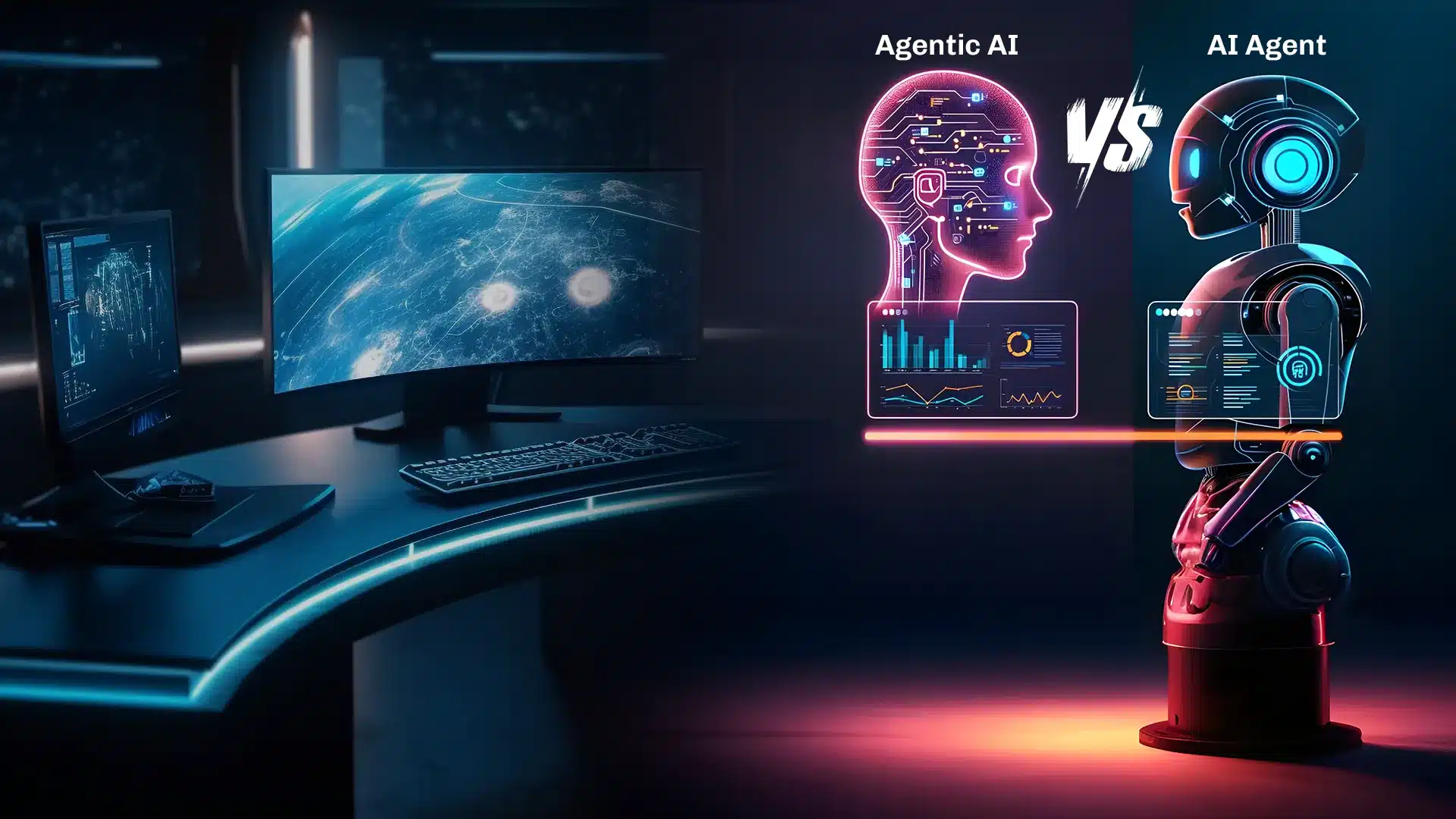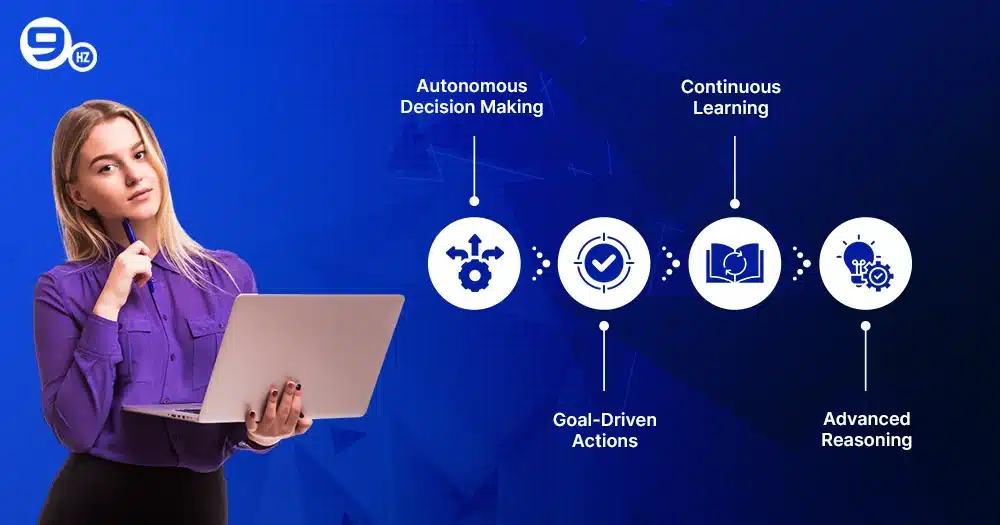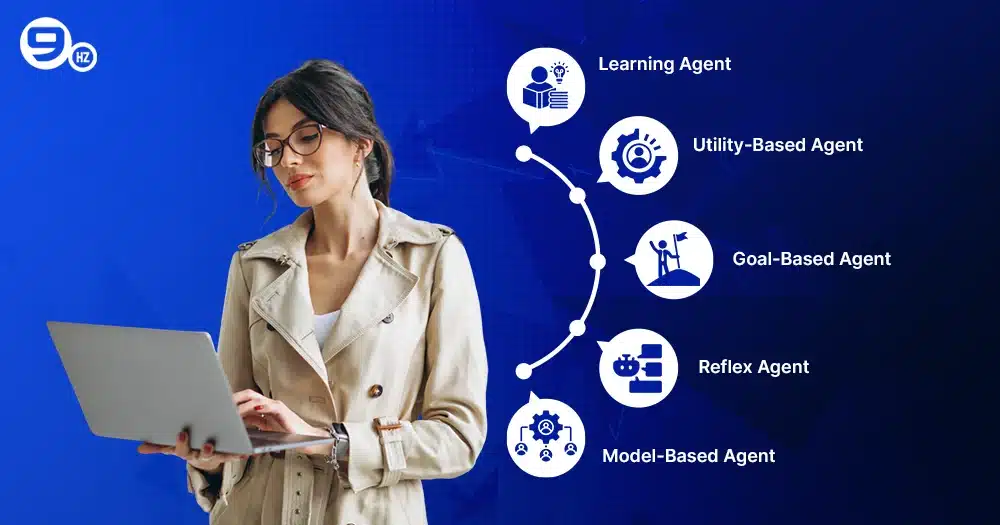The two similar-sounding words, agentic AI and AI agents, have been making a lot of noise on the tech marketplace. Long has been debate on agentic AI vs AI agents, while some perceive them as identical and an advanced version of generative AI, others understand them as tools that are designed to perform practical tasks. According to Gartner, it is anticipated that 33% of the enterprise software applications will depend on agentic AI by 2028. At the same time, more than 80% of common customer service issues will also be resolved using Agentic AI by 2029.
Similarly, the AI agents market has been valued at $5.1 billion in 2024, which is all set to achieve the valuation of $47.1 billion by 2030. The significant increase in the valuation marks a CAGR of 44%, which is very rare to see in any industry. If you are someone who wants to be a part of this growth by leveraging these technologies in your day-to-day business operations, first, it is important to understand the difference between agentic AI and AI agents.
So, in this blog, we will be discussing all about these technologies, the differences, various use cases, challenges, future opportunities, and everything that you are curious to know about.
What is Agentic AI?
Agentic AI are the intelligent systems that carry autonomous decision-making capabilities. It means that the agentic AI systems are capable of identifying the situations and making informed decisions to control the overall environment. It comes with a lot of capabilities like goal-driven actions, advanced reasoning, learning ability, and adaptability. An agentic AI development company leverages these technologies to deploy multiple agents to handle the complex workflows on their own and also learns from its interactions and experiences with the users. Thus, the decisions made by agentic AI also evolve over time.
Here are the four main features of Agentic AI-
1. Autonomous decision making
Agentic AI requires minimal or no human intervention to understand the environment and make informed decision. It has the capability to act independently according to the particular situations.
2. Goal-Driven Actions
Unlike traditional AI solutions, which work on predefined patterns and data, agentic AI focuses on choosing a series of actions to achieve specific goals.
3. Continuous Learning
This is one of the core competencies of agentic AI that helps it to enhance the user experience over time. The system learns continuously from the environment and interactions to enhance decision making.
4. Advanced Reasoning
The advanced reasoning feature of agentic AI helps it coordinate across different databases and tools that helps it manage the more complex tasks efficiently.
What is an AI agent?
Talking about the AI agent, it is somewhat less advanced as compared to the agentic AI. The system completely works on the pre-defined frameworks and patterns. So, it does have decision-making capabilities, but it only works in trained situations and environments. Moreover, an AI agent is capable of performing only one task. Thus, to complete a long and complex task, multiple AI agents have to be interconnected to execute the action. Here are the different types of AI agents used by businesses-
1. Learning Agent
As the name suggests, this AI agent is used to bring the learning capability into the system so that the overall solution can provide better results by learning from the experiences.
2. Utility-based agent
This type of AI agent is designed to decide by analyzing the possible outcomes.
3. Goal-based agents
The goal-based AI agent is focused on achieving certain goals and thus curating the complete path to achieve that goal. In the meantime, it might execute actions which might not be that appropriate or accepted.
4. Reflex agent
Reflect agent is trained to react directly according to the provided user input. For example, it can turn off a machine as soon as the heating temperature reaches a certain level.
5. Model-based agent
This type of AI agent uses the internal representation of the environment and thus helps in making better decisions.
8 Key differences between Agentic AI and AI Agents
Let’s have a glance at AI agents vs agentic AI via their core capabilities-
| Aspect | Agentic AI | AI Agents |
|---|---|---|
| Definition | Agentic AI is a sophisticated system of AI technology that can make informed decisions without human intervention. | These are the separate AI units where each AI agent is designed to perform a particular type of task. |
| Focus | Focuses on long-term goal pursuit, reasoning, and autonomy | Focuses on the automation of specific user-defined actions and task completion |
| Level of Autonomy | High — can automatically make decisions, adapt strategies, and plan | Varies — mostly depends on the predefined scripts or rules |
| Purpose | Simulate intelligent, purposeful behavior like a human agent | Assist or automate user tasks |
| Examples | OpenAI’s agentic frameworks, AutoGPT, and advanced multi-agent systems | Chatbots, customer service bots, virtual assistants (like Siri) |
| Learning Capability | High learning ability to enhance the results with each interaction | Learning depends on the type of AI agent that has been integrated into the system |
| Architecture | Planning, memory, tool use, and recursive reasoning | Designed for a particular workflow and action |
| Goal Orientation | Pursues complex, multi-step goals over time | Executes short-term or specific tasks on command |
| Complexity | Higher, more sophisticated design and coordination | Lower — simpler logic, easier to develop and manage |
1. Autonomy Level
Agentic AI has a higher autonomy level as compared to AI agents, as it can perform tasks and make decisions without any interference of human. On the other hand, AI agents can only perform the pre-determined and trained tasks as human. Navigating the complex tasks is much easier with Agentic AI as it is a sophisticated AI system, unlike AI agents, which requires the collaboration of different agents in order to complete one task.
2. Goal Orientation
Agentic AI solutions are designed to focus on and achieving the long-term goals. Whereas Agentic AI systems are trained to execute specific tasks like customer service without caring about the long-term vision. Agentic AI can pursue the broader objectives that covers the strategy making, decision making, choosing the course of actions, and much more.
3. Learning Capabilities
Agentic AI has significant learning capabilities as it can grab the information and results obtained from the specific task or decision. This information helps the agentic AI solutions to make the required changes in the future and achieve better results. AI agents can only have learning capabilities when a specific type of AI agent is integrated into the system. Typically, it requires manual training and refreshing the database in order to teach new things to AI agents.
4. Complexity
As agentic AI solutions are capable of performing the more complex tasks, their architecture is also more complex yet sophisticated. The complete technology architecture of agentic AI consists of machine learning algorithms, large language models, and more that help them to perform a range of tasks without requiring the assistance of human. On the other hand, the technology architecture of AI agents is simple as they are trained to perform a specific task or execute only a single type of action.
5. Decision-Making Process
There is a big difference in the decision-making process of agentic AI and AI agent solutions. Agentic AI utilizes a more explained mechanism that takes into account different factors and circumstances to choose the action and make the decision. Thus, there are only a few chances of biased or unethical actions. Talking about an AI agent, it solely focuses on achieving the particular goal, and thus, it doesn’t take into account the effect of actions on the other parts of the process.
6. Functionalities
Agentic AI software is designed to work on a vast and broader scale, and thus it can combine multiple skills and steps with smooth coordination. The ability of Agentic AI to achieve its goals with a synchronized workflow seems more managed and defined. On the other hand, AI agents are designed to perform a particular task and operate within the pre-described environment. So, the functionality of the AI agent is limited to its programming and training.
7. Adaptability to Change
It is very easy for the agentic AI to actively respond to the changes happening in the environment, and thus it can easily cope with the uncertainty without affecting the outcome. For example, the agentic AI can help a self-driving car make an instant decision based on traffic, road conditions, and weather. AI agents don’t have an autonomous adaptability to change, and thus, they can only react to specific input without adjusting the overall behavior.
8. Integration with Technologies
Agentic AI can be effectively integrated with various other technologies and platforms. It also helps in enhancing the overall capabilities of the solution, leveraging data from the different internal and external sources, and overall elevates the decision-making capabilities. AI agents cannot integrate the other technologies, and thus, they can only be implemented in particular situations and operations.
5 Use Cases of AI Agents vs Agentic AI
While agentic AI vs AI agents might share the same use cases, the application of both technologies is entirely different. So, the implementation of either of the solutions is entirely dependent on the outcome and goals of the business. Let’s have a look at some best use cases of AI agents vs Agentic AI-
1. Streamlining HR Workflow
| Agentic AI | AI Agents |
|---|---|
|
|
2. Service Desk Automation
| Agentic AI | AI Agents |
|---|---|
|
|
3. Security Implementation
| Agentic AI | AI Agents |
|---|---|
|
|
4. Better Healthcare
| Agentic AI | AI Agents |
|---|---|
|
|
5. Enhanced eCommerce Experience
| Agentic AI | AI Agents |
|---|---|
|
|
6 Challenges Associated with AI Agents and Agentic AI
There is no doubt that AI agents and agentic AI solutions have been helping brands to grow exponentially while keeping the operations cost-efficient yet effective. However, there are certain challenges associated with the implementation of these technologies that can not be addressed. Let’s have a look at some most talked-about challenges related to the implementation of AI agents and Agentic AI-
1. Job Displacement
This is one of the most talked-about risks associated with the use of artificial intelligence in businesses. According to Statista, AI will generate at least 69 million new jobs in the future. However, it can not be denied that these new jobs will come at the cost of millions of jobs lost in the current time. While the smarter jobs might evolve, the traditional workers, like drivers, customer service agents, and healthcare workers, might have to suffer.
2. Ethical Accountability
There is no doubt that an AI solution can perform tasks a thousand times faster while ensuring efficiency, the ethical accountability always remains a concern while implementing them. These solutions focus on achieving the goals via a trained framework. During the execution of the process, there are always chances of unexpected actions, unethical practices, and mechanical bias.
3. Data Privacy
The artificial intelligence tools like Agentic AI and AI agents need huge amount of data for training and functioning. So, it causes concerns regarding data privacy and confidentiality as businesses have to share their confidential data along with customer information to leverage the benefits. Being the mechanical resources, there are always chances of hacking and data breaches.
4. Technical Complexity
AI agents vs agentic AI is a comparatively novel concept in the market, and thus there are very few experts who specialize in the efficient implementation of these technologies. So, there is a complexity challenge which makes it difficult for the businesses to create their customized AI solution, provide training, and leverage the benefits.
5. Regulatory Compliances
There are different rules and regulations regarding the use of AI in multiple countries and industries. So, the businesses have to ensure that they are complying with the defined standards and regulations while implementing agentic AI and AI agents into their system. Otherwise, they might have to face the legal consequences.
6. Implementation Cost
The AI solutions can help in saving a lot of resources and infrastructural costs for businesses, but they require a good investment in the beginning. Whether it is purchasing the data for the training, hiring the programmers and developers, allocating computers and machines, or paying for the regular maintenance and support, there are a lot of costs associated with the implementation of AI solutions.
Future of Agentic AI and AI agents
As it can be interpreted from the above use cases and advancements of both these tools that businesses are going to be highly dependent on agentic AI and AI agents for their day-to-day operations, the future of this technology is all set to open even more advancements and innovation. While these tools are offering tremendous benefits to businesses, their capabilities are yet to be explored.
1. Agentic AI
First, talking about the agentic AI, it is expected to move from just a tool to an autonomous collaborator that will not just complete the task but will also make informed decisions, adapt the strategies, and help the brands to improve according to evolving market trends.
There is no doubt that the capabilities of agentic AI might make them the mini CEOs of the companies, as they will be playing a role in all the major operations of the company. Moreover, the self-healing system is the anticipated future of agentic AI, where it will be able to identify, analyze, and fix the problem without any interference or guidance from humans.
2. AI Agents
Coming to AI agents, it is expected to be continuously transforming in terms of conversational capabilities, task integrations, and workflow automation. While they will still be preferred for the task-specific functions, the efficiency and accuracy will undoubtedly increase. AI agents can be amazing digital workers for the brands that need slight direction and guidance to get the tasks performed much faster.
The multi-agent system will be leading the scenario where each unit will be trained with high-quality data, eliminating the chances of bias and unethical outcomes. The seamless integration of IoT devices can make AI agents a part of every household.
How can The NineHertz Help You to Make the Right Choice and Leverage Benefits?
The NineHertz is a leading IT company that provides top-notch artificial intelligence development services to help businesses assess their real-time needs and choose the best solutions based on their unique challenges and goals. Our team helps you to understand your current gaps in the system, analyze your scope, find the room for improvement, and thus helps you choose the right solution so that you don’t waste your time, money, and resources.
We have experience of more than 15 years in this field, and we work with 350+ technical experts, engineers, designers, and industry specialists. The NineHertz offers a free consultation session to businesses in which our experts guide you regarding choosing the right technology solution, required timeline, estimated costs, and much more.
At the same time, at The NineHertz, you get everything under one roof, and thus there is a big space to explore and choose the ideal technical product. From analysis to implementation and maintenance, our team offers you consistent support throughout the process.
Final Words
Agentic AI vs AI agents are often misunderstood to be similar, while they carry a big difference. While AI agents are designed to automate a particular task by using the trained data, agentic AI is a much advanced concept that helps in automated decision making, performing multiple tasks, and eliminating human interference from the process. Both technologies have their dedicated use cases. Agentic AI is a more sophisticated system that helps to handle complex tasks. On the other hand, AI agents can be used to carry out a specific task in a specific manner. Thus, it doesn’t have the decision-making capability and requires human assistance.
If you are looking to implement either of these and seeking expert guidance, sign up for our free consultation session where our experts will connect with you and guide you throughout the journey.
FAQs
What is the difference between Agentic AI and AI agents?
Answer- Agentic AI is the more advanced solution with high autonomous capabilities. It can make decisions, perform complex tasks, and make changes without any human assistance. On the other hand, AI agents are the units trained to perform a particular task in a defined manner. It requires consistent human support.
What should I choose between Agentic AI and AI Agents?
Answer- The choice between agentic AI and AI agents entirely depends on your particular task goals. For example, if you are looking to automate the entire working process in your operations while eliminating human interference, agentic AI can be a better option. On the other hand, if you need assistance in performing a specific task and a less complex system, you can go for AI agents.
Are agentic AI and AI agents the same?
Answer- No, agentic AI and AI agents are entirely different terms and technologies. Agentic AI is the concept of automating the entire process while minimizing the need for human interference. It can make independent decisions. AI agents are designed to perform a specific task according to pre-provided training.
Great Together!





![Building Agentic AI Applications with a Problem-First Approach [2026 Guide]](https://theninehertz.com/wp-content/uploads/2026/02/Building-Agentic-AI-Applications-with-A-Problem-First-Approach.png)





